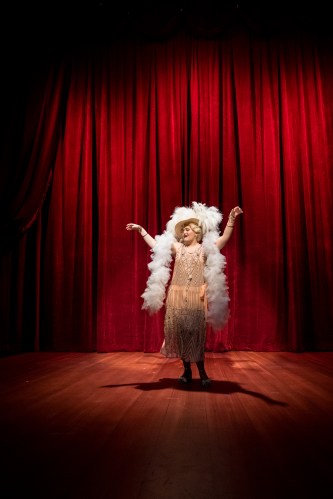There’s an incredible courtroom scene in the 1933 film “I’m No Angel,” written by Mae West, which she starred in with Cary Grant. West’s character, Tira, tells her lawyer she wants to cross-examine all the witnesses herself. She brings her quick-quip banter to the proceedings, seductively eyes the judge, and charms not only the jury but the defendant she’s suing (played by Grant), who sheepishly agrees to pay up what she says he owes her.
West knew a thing or two about courtrooms, after getting mixed up in a number of legal cases. Most famously, she was sentenced, along with James A. Timony, her manager and legal counsel, and Clarence William Morganstern, a theatrical producer, to 10 days in jail for “corrupting the morals of youth” with West’s play, “Sex,” in 1927. They were also fined $500 each.
In “Mae West and the Trial of Sex,” Walking Shadow Theatre Company in Minneapolis mines the events surrounding West’s “Sex” trial and puts a microscope to censorship proponents during the time period. That includes the New York Society for the Suppression of Vice (a group that also was responsible for banning James Joyce’s “Ulysses” in America until 1934), as well as the lawmakers who passed New York State’s Wales Padlock law, allowing authorities to shut down theaters that were found to produce “immoral” productions.

Written by John Heimbuch and directed by Allison Vincent, the play resonates with today’s current culture wars, what with book bans going after authors writing LGBTQ or other diverse content, drag story hour artists getting harassed around the country, and the Trump administration’s censorship of artists via executive orders and national policy.
Heimbuch’s script draws on not only West’s performance of “Sex” and its aftermath, but also another one of her plays, a melodrama called “The Drag.” That play proved just as controversial as “Sex,” due to its gay characters, and closed after successful trial runs in Connecticut and New Jersey.
Playing Mae West, Emily A. Grodzik gets the walk and delivery just right. With her Brooklyn accent and cool timing, she mirrors the persona that made West famous, but she’s also adding an element we don’t see when we watch West act in films: her creative power. This Mae West is fearless, confident and utterly ruthless in pursuit of her creative goals, and she’s absolutely in charge of the show. And while her movie roles are mostly concerned with the various romantic relationships her characters pursue, we don’t see much of that in the play.
There are a couple of characters in the play that West was romantically linked to in life — her manager Timony (played by Joe Swanson) for one, and Irish-American gangster Owney Madden (Jack Bechard) — but their interactions here are for the most part business.
The script works best when it leans into the West-ian banter. Heimbuch sprinkles in lines West was known for throughout the script, and others that sound like they could have been written by West. Structurally, the play takes a Brecht-like approach, with direct address mixing with dialogue, and quick episodic scenes where the actors switch between a number of different parts and change costumes in dressing room stations on each side of the stage.
The play does have a couple of songs, but I wanted more. The script is just begging for a few showstopper, big cast numbers with audacious set pieces and maybe a drag ball or two. And while I think Mandi Johnson did an admirable job with the costume design, I’d love to see more of the outrageous outfits West was known for wearing.

I was a bit confused at why the script spent so much time with a plagiarism case West faced before the indecency trial. In 1926, a young man named John J. Byrne sued West, her manager, and her company (called Moral Producing Co.), alleging she essentially copied his one-act script, “Following the Fleet.” We find out in the course of three scenes that West essentially hired Byrne to write up a script based on her idea. Not liking the final copy, they paid him $200 and ultimately produced a different version of the idea as a three-act play. To me, the plagiarism case wasn’t as interesting as the censorship trial and “The Drag” production, but after a while I realized Heimbuch included it for two reasons.
Firstly, it establishes West as an artist who had no problem appropriating from others where she saw fit. In another example, we see her explicitly telling one of the gay actors in “The Drag” (played by Neal Beckman) that she wants him to contribute material for the script (without credit). We also learn she’s appropriating heavily from not only queer culture lifted from the Greenwich Village scene but also African American culture. In fact, West caused a sensation early in her stage career performing “the shimmy,” a dance she picked up from watching Black dancers in Chicago.
The plagiarism case, which West won, also established an important record that would have implications in the morals case. The judge called the play “undeniably salacious.” In the last plagiarism trial scene, we see Grodzik slump with the knowledge that his words will impact the strength of her case against censorship. By calling the play “salacious,” the judge is establishing the description has precedent.
West’s battle over “Sex” wasn’t her first encounter with censorship. Despite her enormous success in Hollywood in the 1930s, her most risqué lines would often get cut due to the Motion Picture Production Code (otherwise known as the Hays Code), and she was banned from NBC radio in 1937. Yet despite this, she stayed true to her bold, liberated spirit throughout her life, even starring as a sex symbol in her final film, “Sextette” at the age of 87. Ultimately, “Mae West and the Trial of Sex” celebrates West’s efforts to combat the moral panic of her day that feared female sexuality as much as it feared gay people and people of color.
As this same sort of crackdown rears its head in today’s world, it’s good to remember the fighters for creative freedom of yesteryear.
Mae West and the Trial of Sex runs Thursday, June 5, through Saturday, June 7, at 7:30 p.m., Monday, June 9, at 7:30 p.m., through June 22 at the Crane Theater, 2303 Kennedy St, Minneapolis, ($30-$70). More information here.



